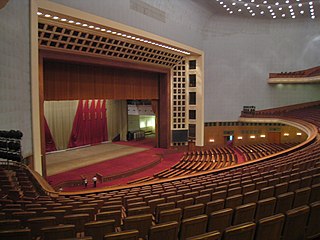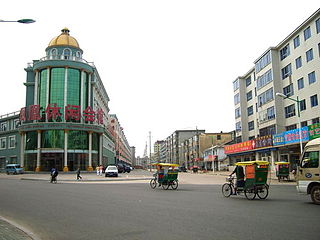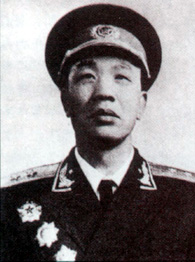Related Research Articles

Zhu Rongji is a retired Chinese politician who served as the 5th premier of China from 1998 to 2003. He also served as member of the Politburo Standing Committee of the Chinese Communist Party (CCP) from 1992 to 2002,under CCP general secretary Jiang Zemin.

Jilin is one of the three provinces of Northeast China. Its capital and largest city is Changchun. Jilin borders North Korea and Russia to the east,Heilongjiang to the north,Liaoning to the south,and Inner Mongolia to the west.
Generations of Chinese leadership is a term historians use to characterize distinct periods of the leadership of the Chinese Communist Party (CCP) and,by extension,successive changes in the ideology of the CCP. Historians have studied various periods in the development of the government of the People's Republic of China (PRC) by reference to these "generations".
In the People's Republic of China,Deng Xiaoping formally retired after the 1989 Tiananmen Square protests and massacre,to be succeeded by CCP secretary Jiang Zemin. During that period,the crackdown of the protests in 1989 led to great woes in China's reputation globally,and sanctions resulted. The situation,however,would eventually stabilize. Deng's idea of checks and balances in the political system also saw its demise with Jiang consolidating power in the party,state and military. The 1990s saw healthy economic development,but the closing of state-owned enterprises and increasing levels of corruption and unemployment,along with environmental challenges continued to plague China,as the country saw the rise to consumerism,crime,and new-age spiritual-religious movements such as Falun Gong. The 1990s also saw the peaceful handover of Hong Kong and Macau to Chinese control under the formula of One Country,Two Systems. China also saw a new surge of nationalism when facing crises abroad.

Wang Qishan is a Chinese retired politician who was one of the leading members of the Chinese Communist Party (CCP).

The 17th National Congress of the Chinese Communist Party was held in Beijing,China,at the Great Hall of the People from 15 to 21 October 2007. Congress marked a significant shift in the political direction of the country as CCP General Secretary Hu Jintao solidified his position of leadership. Hu's signature policy doctrine,the Scientific Development Concept,which aimed to create a "Socialist Harmonious Society" through egalitarian wealth distribution and concern for the country's less well-off,was enshrined into the Party Constitution. It was succeeded by the 18th National Congress of the Chinese Communist Party.

Hunchun is a county-level city in the Yanbian Korean Autonomous Prefecture within Jilin province to the far east. It borders North Hamgyong Province in North Korea and Primorsky Krai in Russia,has over 250,000 inhabitants,and covers 5,145 square kilometers. The site of the eastern capital of the Balhae Kingdom between 785 and 793,Donggyeong,was located here.
The 15th Central Committee of the Chinese Communist Party was in session from 1997 to 2002. The 14th Central Committee preceded it. It was followed by the 16th Central Committee of the Chinese Communist Party. This was the first Central Committee that current CCP general secretary Xi Jinping was elected to,as an alternative member.
The 14th Central Committee of the Chinese Communist Party was in session from 1992 to 1997. It held seven plenary sessions. It was preceded by the 13th Central Committee. It was elected by the 14th National Congress of the Chinese Communist Party and in turn elected the 14th Politburo of the Chinese Communist Party.

Du Qinglin is a politician of the People's Republic of China. He formerly served as vice chairman of Chinese People's Political Consultative Conference (CPPCC),and a Secretary of the Secretariat of the Chinese Communist Party (CCP). From 2007 and 2012 he served as the director of United Front Work Department of CCP Central Committee.
Events in the year 1989 in the People's Republic of China.

The Central Financial and Economic Affairs Commission is a commission of the Central Committee of the Chinese Communist Party in charge of leading and supervising economic work of both the CCP Central Committee and the State Council. The Commission is generally headed by CCP General Secretary or Premier of the State Council.
Bayanqolu is a Chinese politician of Mongol ethnicity. He served as the Chinese Communist Party Committee Secretary of Jilin Province from 2014 to 2020 and the Governor of Jilin from 2012 to 2014;Bayanqolu was,at the time of his appointment,the only ethnic-minority official serving as a provincial-level Party Secretary.
Han Yong is a former Chinese politician who served as chairman of the Shaanxi Provincial Committee of the Chinese People's Political Consultative Conference between 2016 and 2022. He spent his early career in his native Jilin province,before being transferred to work in Xinjiang in 2004,where he served as regional organization chief,deputy party chief,and political commissar of the Xinjiang Production and Construction Corps.

Wang Enmao was a People's Liberation Army lieutenant general and a People's Republic of China politician. He was born in Yongxin County,Jiangxi Province. He was twice Chinese Communist Party Committee Secretary of Xinjiang. He was Chinese Communist Party Committee Secretary and governor of Jilin.

Li Mengling (1903–1985) was a People's Republic of China politician. He was born in Jin County,Hebei Province. He was Chinese Communist Party Committee Secretary of Jilin Province. He was a deputy for Jilin to the 1st National People's Congress in August 1954.

Fu Zhong was a general in the People's Liberation Army of the People's Republic of China from Sichuan.
Wang Guofa was a Chinese politician who served as Vice Governor of Jilin Province and Chairman of the Jilin Provincial Committee of the Chinese People's Political Consultative Conference (CPPCC).

Wang Kai is a Chinese politician currently serving as the governor of Henan. Previously he served as the party chief of Changchun,the capital of northeast China's Jilin province. He entered the workforce in October 1983,and joined the Chinese Communist Party in December 1984.
Gao Yan is a Chinese former politician. He served as the Governor of Jilin and the Communist Party Secretary of Yunnan and was a member of the Central Committee of the Chinese Communist Party. He reportedly fled the country in 2002 amidst investigations into corruption as the leader of the State Power Corporation of China.
References
Citations
- ↑ "No label defined". entities.oclc.org. Retrieved 2024-12-09.
- 1 2 3 4 Mackerras (2001) , p. 131.
- ↑ Cotton (1996), p. 1088.
- 1 2 China Today.
- 1 2 3 4 Zheng (2004) , pp. 103–4.
- ↑ Lai (2006), particularly p. 218.
- ↑ Cotton (1996), p. 1091.
- ↑ "14th Central Committee of the CPC", People's Daily Online, Beijing. (in Chinese)
- ↑ "15th Central Committee of the CPC", People's Daily Online, Beijing. (in Chinese)
- 1 2 3 Winckler & al. (2005) , p. 176–7.
- ↑ Cotton (1996), p. 1086.
- ↑ Cotton (1996), p. 1094.
- ↑ Cotton (1996), p. 1095.
- ↑ CIIC (2001) , " Organizing Committee ".
- ↑ Ghana Emb. (2005).
- ↑ "Structure". aicesis.org. Retrieved 2024-12-09.
Bibliography
- "APEC 2001 in China", Official site, Beijing: China Internet Information Center, 2001.
- "Wang Zhongyu", China Today, Beijing: InfoPacific Development Inc.
- "Hon. Wang Zhongyu Heads CPPCC Delegation to Ghana", Official site, Accra: Embassy of the PRC in the Republic of Ghana, 2005.
- "Wang Zhongyu", People's Daily Online, Beijing: People's Daily.
- "Wang Zhongyu", China Vitae, Carnegie Endowment for International Peace, 26 March 2006.
- Cotton, James (Nov 1996), "China and Tumen River Cooperation: Jilin's Coastal Development Strategy", Asian Survey, vol. 36, Berkeley: University of California Press, pp. 1086–1101.
- Lai Hongyi (2006), "Divergent Reform Paths in Two Provinces", Reform and the Non-State Economy in China, New York: Palgrave Macmillan, pp. 191–230, ISBN 9780312376161 .
- Mackerras, Colin (2001), The New Cambridge Handbook of Contemporary China, Cambridge: Cambridge University Press, ISBN 9780521786744 .
- Winckler, Edwin A.; et al. (2005), Governing China's Population: From Leninist to Neoliberal Biopolitics, Stanford: Stanford University Press, ISBN 9780804748803 .
- Zheng Yongnian (2004), Globalization and State Transformation in China, Cambridge: Cambridge University Press, ISBN 9780521537506 .